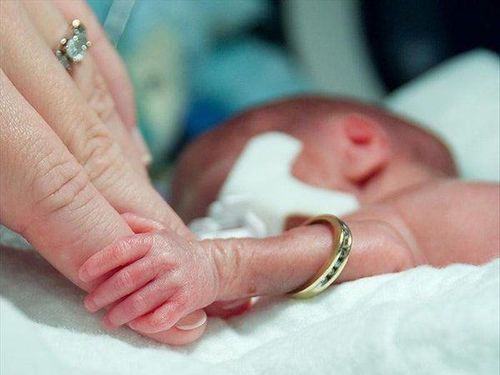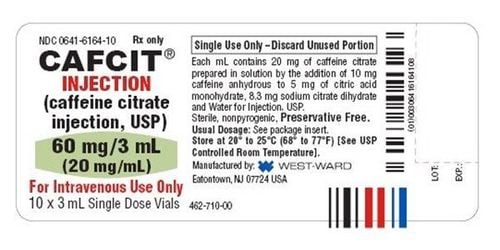This is an automatically translated article.
The article was professionally consulted by Dr. CKI Nguyen Thi My Linh - Department of Pediatrics - Neonatology - Vinmec International General Hospital Da Nang. Uncle has 12 years of experience in the diagnosis and treatment of pediatric diseases, especially neonatal resuscitation and neonatal treatment. In addition, the doctor has strengths in the field of breastfeeding counseling as well as examination, counseling and nutritional intervention in children.Usually, premature babies often have physical problems as well as face more risks of adverse effects to the baby than babies born at full term. Premature babies have separate development measurement standards so that their mothers can check, monitor and promptly handle according to the doctor's opinion.
1. What is a premature baby?
Previously, according to regulations, preterm infants were those with birth weight below 2,500g. However, this definition is found to be inaccurate, easily confused with low birth weight babies, babies born with fetal nutrition. Therefore, the World Health Organization (WHO) has revised the definition, infants born before 37 weeks (counting from the first day of the last menstrual period) are premature babies.Classification of preterm infants:
Late preterm birth: From 34 weeks to 36 weeks 6 days. Moderately preterm birth: 32 to < 34 weeks. Very premature birth: ≤ 32 weeks. Extremely preterm birth: < 28 weeks. Because of early birth, premature babies are born with low birth weight and are at great risk. The lower the gestational age, the higher the risk. Therefore, the mother must be more patient and meticulous to do all the things that need to be done to take care of the premature baby and help the baby develop as normal.
Trắc nghiệm: Thế nào là trẻ sơ sinh non tháng?
Trẻ sơ sinh non tháng rất cần được chăm và điều trị thật tốt để giúp giảm nguy cơ gặp phải các di chứng về tinh thần, vận động và sự phát triển sau này. Cùng theo dõi bài trắc nghiệm dưới đây để có thể nhận biết trẻ sơ sinh non tháng và có thêm kiến thức chăm sóc, nuôi dưỡng tốt nhất cho trẻ.The following content is prepared under supervision of Thạc sĩ, Bác sĩ y khoa, Ma Văn Thấm , Nhi , Phòng khám Đa khoa Quốc tế Vinmec Dương Đông(Phú Quốc)
2. How is it normal for premature babies to gain weight?
The rule is that 1 month of external feeding equals 1 month of normal feeding in the womb is satisfactory, and if the growth is more than that, it is good.Example: If your baby was born prematurely at 8 months (ie 32 weeks), you feed him for a month, then his weight gain after 1 month must be equal to the weight of the fetus increasing from 8 to 9 months (from week 32 to week 36) is satisfactory.
In particular, just remember that the baby's weight after 6 months will double at birth to meet the standard.
If the baby's weight gain is only 1/3 of the required index, it is a premature baby with low birth weight and growth retardation, the mother needs the support of qualified medical staff.
In general, preterm infants need careful weight care before discharge, and the standard weight gain is at least 5 grams per day in extremely preterm infants, or 20 grams per day in very preterm infants. . And in any case, babies need to gain 15 grams per day for every 1kg of their weight.
See more: Feeding a 26-week-old premature baby with special measures at Vinmec

3. How to take care of premature babies?
How to take care of premature babies who gain weight? This is a question that many mothers of low birth weight premature babies want to answer to help their baby develop properly and meet the standards. Here are special notes that mothers of premature and low birth weight babies need to apply to take care of premature babies back to normal weight quickly:Breastfeeding When a baby is born prematurely, immediately after When giving birth, you need to find a way to breastfeed or drink breast milk as soon as possible. Because the nutritional components in breast milk are very good for the baby's brain and body development.
Maintaining breast milk is very good, because premature babies have very weak digestion, only breast milk has digestive enzymes to help babies easily absorb nutrients. Breastfeeding should be done little by little because babies absorb food more slowly than other babies.
You can rest assured that your baby is getting enough milk if your baby has a bowel movement 3-4 times a day, urinates 6 or more times and seems full after each feeding.
At the end of the 2nd week, the number of bowel movements will decrease. Premature babies often spit up milk when feeding, if the baby is still gaining weight, this is completely normal. If your baby stops or loses weight, you need to talk to your doctor.
Supplementing with vitamins and iron As soon as the baby is born, the mother pays attention to supplementing the necessary nutrients for her body such as vitamins A, K1, ... to help the baby strengthen resistance, limit diseases disability. When supplementing with these vitamins, it is necessary to follow the prescription of a specialist.
In addition to breast milk and formula, premature babies need more nutrition than full-term babies. Therefore, mother tries to eat more beef and liver to increase iron. Drink any type of milk powder that is easily absorbed by the mother, as long as you drink 1 liter of milk every day. Add vitamin D3 to increase calcium absorption in milk (400 UI/day).
Keeping baby's hygiene For babies born prematurely, the more they need to clean their skin like normal babies, they have to bathe them daily with warm water.
Note: Take a quick shower, dry the baby, pay attention to the skin under the chin, where milk is easy to collect. There are many mothers who see their baby too much and are afraid not to bathe their children, which is not good because it is easy to make the baby's skin dirty and cause skin diseases.
Keep baby's body warm It is best to keep the baby's body temperature stable in the range of 37 degrees Celsius. Because at this time, the amount of fat under the baby's skin is very thin and cannot keep the body warm. The risk of metabolic, respiratory disorders, hypoxia and cerebral hemorrhage is higher than normal. Premature babies have poor resistance, immunity is not as good as full-term babies, so keeping them warm is extremely important.
If the climate is cold in the winter, the baby needs to be in a room with a stable temperature, wear a thin hat, wear socks and socks, keep the neck and belly warm.

Baby massage To help the premature baby become strong and fast, and help the baby's respiratory system work better, the mother can gently massage the baby. Proper massage also helps to improve the body's resistance, accelerate metabolism and eliminate toxins through the skin.
Monitoring baby's health Due to weak health and sensitive body, many premature babies face serious health problems such as heart disease, brain hemorrhage, kidney failure, jaundice, anemia and other problems. lung problems, vision, hearing, psychomotor development. Therefore, mothers should monitor the baby's physical manifestations, if there are any abnormalities, they should take them to a pediatrician for timely treatment.
Vinmec Times City International General Hospital has saved thousands of premature babies over the years. Vinmec has mastered the measures to feed very premature babies, being the first hospital in the North to take care of babies born 24 weeks premature. The procedures for caring and nurturing premature babies in particular and infants with pathologies in general at Vinmec bring about the same efficiency as in advanced countries, increasing the chances of babies being saved and healthy living. premature birth, increasing the chances for infertile families.
Advantages in the treatment and care of premature babies at Vinmec Times City include:
Modern equipment: Normal ventilator, high frequency ventilator, CPAP ventilator, high-end infant incubator, Good infection control ability, ensuring a safe environment for children Experienced doctor and nurse: BSCK II Tran Lien Anh used to teach neonatal diseases with a long working history at the hospital. Neonatal Resuscitation Department at the National Children's Hospital from 1979 to 2012 and is currently working as the Head of Neonatology Department, Vinmec Times City International General Hospital from 2012 to present. Not only taking care of premature babies, Vinmec also successfully operated and saved many babies with complex birth defects.
Please dial HOTLINE for more information or register for an appointment HERE. Download MyVinmec app to make appointments faster and to manage your bookings easily.















